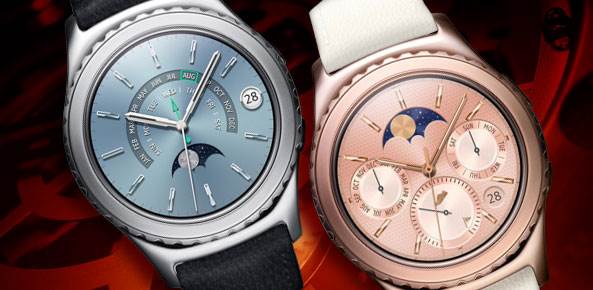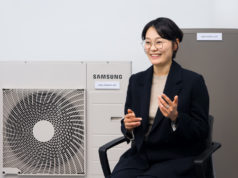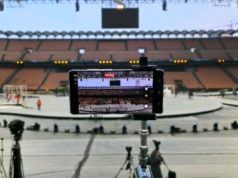The Apple Watch has taken the industry by storm. All other smart watch brands, not so much. Now, Samsung is making a move to change that fact. At CES 2016 in Las Vegas this week, the electronics giant announced new Gear S2 Classic smart watches and vowed to bring iOS support to its smart watch line.
Samsung is rolling out a Gear S2 with 18K rose gold casing (pictured, right) and a second model in platinum (pictured, left). in doing so, the company is aiming to tap into consumer demand for more stylish smart watches. The Gear S2 has a circular design, much like a traditional watch.
In addition, the new Gear S2 Classics will include NFC (near field communication) technology to offer Samsung Pay, which will be available to Gear S2 users in the U.S. early this year. Samsung said it was also expanding its line of watch straps and watch face options.
The company said it has partnered with designers, such as Colombo, on “premium” watch straps for the Gear S2, and introduced fun and creative watch faces including Peanuts characters and artworks from Keith Haring, Jean-Michael Basquiat, Jeremyville and Burton Morris. The new, premium Gear S2 Classics will be available in February. However, Samsung has not yet released any pricing information.
During its announcement, Samsung said eventually the new Gear S2 family of smart watches will work with iOS devices, but did not offer any additional information or a timetable for when they will work with Apple devices.
Setting a New Standard?
Younghee Lee, executive vice president of global marketing for Mobile Communications Business at Samsung, said his company “set a new standard with the Gear S2 in smart wearable category.” He added Samsung “broke barriers” with the Gear S2 and said the company will “continue to raise the bar” in 2016.
In November, reports indicated that Apple had shipped close to 7 million Apple Watches since its launch in April. Samsung will have to raise the bar quite high to compete with the Apple Watch, but there is room in the market for all tides to rise. The worldwide wearable device market is set to post continued growth as second- and third-generation iterations reach the market, according to a December report from market research firm IDC.
Specifically, the worldwide wearable device market will reach a total of 111.1 million units shipped in 2016, up 44.4% from the 80 million units expected to ship in 2015. By 2019, the final year of the forecast, total shipments will reach 214.6 million units, resulting in a five-year compound annual growth rate of 28 percent.
“The most common type of wearables today are fairly basic, like fitness trackers, but over the next few years we expect a proliferation of form factors and device types,” said Jitesh Ubrani, senior research analyst for IDC Mobile Device Trackers, in a statement. “Smarter clothing, eyewear, and even hearables (ear-worn devices) are all in their early stages of mass adoption. Though at present these may not be significantly smarter than their analog counterparts, the next generation of wearables are on track to offer vastly improved experiences and perhaps even augment human abilities.”
Need To Be iOS Agnostic
But smart watches are the most popular wearable and Apple Watch rules the smart watch roost.
IDC predicted Apple’s watchOS will lead the smart watch market throughout its forecast, with a loyal fanbase of Apple product owners and a rapidly growing application selection, including both native apps and Watch-designed apps. IDC noted that watchOS quickly rose to become the measuring stick against which other smart watches and platforms are compared.
The analyst firm said it expected Apple to keep iterating while maintaining the momentum to stay ahead of the competition curve. Android/Android Wear is a distant second at less than 20 percent of the market, compared to watchOS’s more than 61 percent, IDC noted.
We caught up with Roger Entner, principal analyst at Recon Analytics, to get his thoughts on Samsung adding iOS support. “iOS support in the U.S. is very important as it has 40 percent market share. If you want to win significant market share you have to be OS agnostic.”




